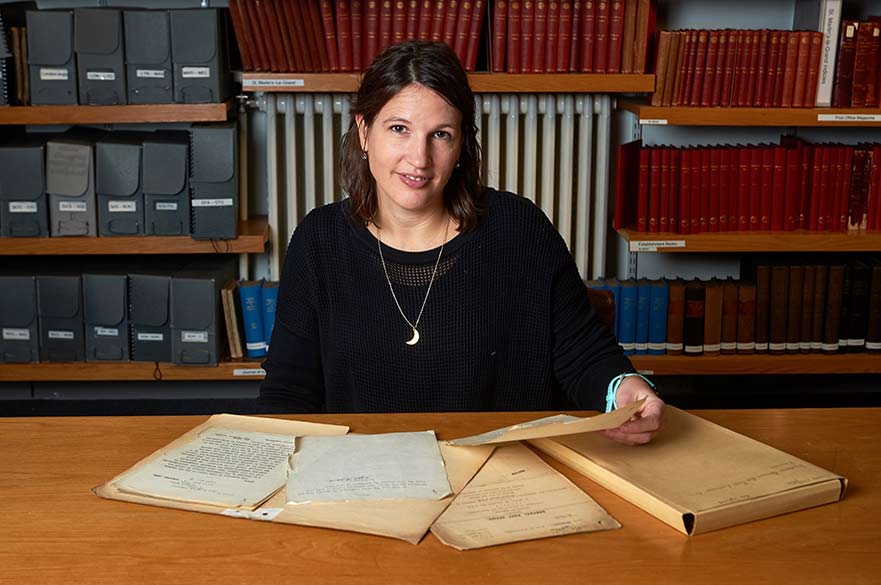Newly discovered letters reveal Sylvia Pankhurst’s wiretapping fears
Newly uncovered correspondence has revealed Sylvia Pankhurst’s concerns over wiretapping, 70 years before the Government disclosed her secret surveillance by MI5 to the public.
By Chris Birkle | Published on 18 December 2018
Categories: Press office;

Newly uncovered correspondence has revealed Sylvia Pankhurst’s concerns over wiretapping, 70 years before the Government disclosed her secret surveillance by MI5 to the public.
As part of an Arts and Humanities Research Council-funded research fellowship at the BT Archives, Dr Sarah Jackson – an Associate Professor at Nottingham Trent University – discovered two letters from Pankhurst to the Postmaster General, questioning the Post Office’s practice of installing ‘duplicate telephone lines,’ enabling users to listen-in and opening the door to ‘improper use by unscrupulous persons’.
Writing from her home on 6 February 1934, Sylvia Pankhurst argued that the installation of duplicate lines for the purpose of intercepting calls would be ‘opposed to the best interests of the community and contrary to public policy’.
Although Pankhurst received a response to her first letter, additional hand-written notes between Post Office employees explained that the response to any subsequent letters must be to ‘stonewall’ Pankhurst.
It was revealed in 2004 that MI5 had monitored Pankhurst’s movements and intercepted her letters in the 1930s and 1940s. There are even references in MI5’s files to ‘telephone checks’ and other intercepted calls.
MI5 files on Sylvia Pankhurst contained information on her work to achieve women’s suffrage as part of the Worker’s Suffrage Federation going back as far as 1914.

Pankhurst’s concerns were initially triggered by a newspaper story of a gynaecologist who was struck off following an affair with a patient. Their relationship had been discovered by the husband of the patient who had made arrangements with the Post Office (which ran the UK’s telephone service at the time) to duplicate the phone line installed on his house in order to intercept calls.
Sarah Jackson, Associate Professor at Nottingham Trent University, said: “Sifting through a file of old press cuttings about wiretapping, I was astonished to find letters from Sylvia Pankhurst to the Postmaster General revealing her concerns about surveillance. In the year that we celebrate the centenary of women’s suffrage, the discovery brings home once again the efforts and achievements of this remarkable woman.”
Roey Sweet, AHRC Director of Partnerships and Engagement said: “Sylvia Pankhurst is generally remembered today simply as a militant suffragette, but the exciting discovery of these letters reminds us that her fight for women’s political rights was part of her lifelong commitment to socialist and revolutionary politics, pacifism and internationalism – commitments that would have led to the phone tapping, against which she so rightly objected.”
Notes for Editors
Press enquiries please contact Chris Birkle, Public Relations Manager, on telephone +44 (0)115 848 2310, or via email; or Helen Breese, Public Relations Manager, on telephone +44 (0)115 848 8751, or via email.
About Nottingham Trent University
Nottingham Trent University (NTU) was named University of the Year 2017 at the Times Higher Education Awards, and Modern University of the Year in the Times and Sunday Times Good University Guide 2018. These awards recognise NTU for its high levels of student satisfaction, its quality of teaching, its engagement with employers, and its overall student experience.
NTU has been rated Gold in the Government’s Teaching Excellence Framework – the highest ranking available.
NTU is one of the largest UK universities. With 30,000 students and more than 4,000 staff located across four campuses, the University contributes £900m to the UK economy every year. It is one of the UK’s most environmentally friendly universities, containing some of the sector’s most inspiring and efficient award-winning buildings. 96% of its graduates go on to employment or further education within six months of leaving.
Our student satisfaction is high: NTU achieved an 88% satisfaction score in the 2018 National Student Satisfaction Survey.
The University is passionate about creating opportunities and its extensive outreach programme is designed to enable Nottingham Trent to be a vehicle for social mobility. NTU is among the UK’s top five recruiters of students from disadvantaged backgrounds.
NTU is home to world-class research, and won The Queen’s Anniversary Prize in 2015 – the highest national honour for a UK university. It recognised the University’s pioneering projects to improve weapons and explosives detection in luggage; enable safer production of powdered infant formula; and combat food fraud.
With an international student population of over 3,000 from around 100 countries, the University prides itself on its global outlook